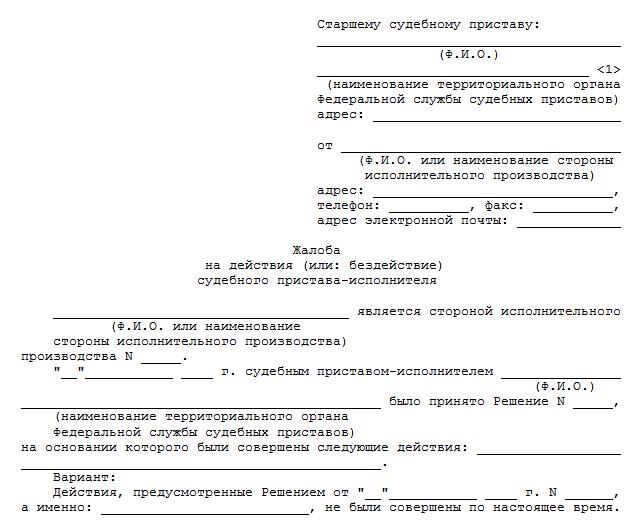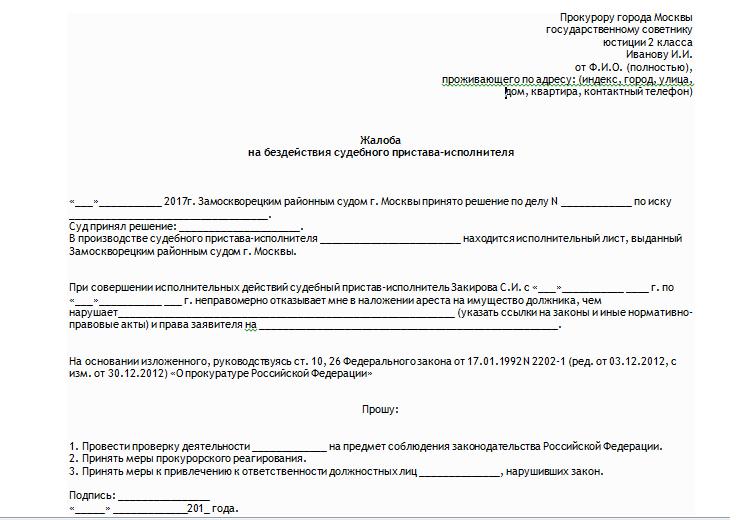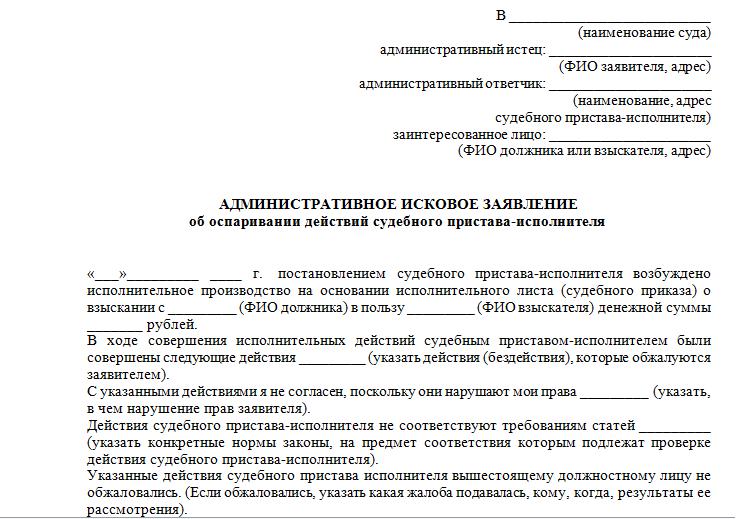Bailiffs are civil servants whose main goal is to act on writ of execution and court orders. They have many opportunities to influence debtors. These include seizure of accounts or property, confiscation and sale of property at auction, the use of a ban on traveling abroad or other measures of influence. Often, experts during their work exceed their authority, so citizens want to challenge certain actions. An appeal of the actions of a bailiff is carried out in various ways, for which official appeals to various state authorities are made.
When is it appropriate to file a complaint?
It is reasonable to appeal the actions performed by bailiffs under certain conditions:
- for various reasons, the contractor does not fulfill its obligations related to debt collection;
- in the process of seizing or confiscating property, the rights or interests of citizens are violated;
- the term expires during which it is possible to collect the debt from the non-payer;
- without good reason, the contractor refuses to study materials related to open production;
- forced collection of money is carried out without prior notification of the debtor about the possibility of voluntary repayment of the debt.
The complaint can indicate not only illegal actions by specialists, but also their inaction in a particular situation. For example, a lender may submit a statement to the senior bailiff stating that the appointed contractor is not managing his duties, as he does not take any measures to force the return of funds.

Where does the complaint go?
An appeal of the actions of a bailiff may be carried out by filing an application with various state organizations. Before filing a lawsuit, it is recommended that you try the administrative method. Therefore, complaints are lodged with the following organizations:
- Initially, an appeal is drawn up to the leadership of the FSSP RF branch in a specific region;
- if there is no result on the application, then a complaint is filed with the prosecutor;
- if, nevertheless, the service employee was not held accountable, then the disagreements are resolved in court, for which a statement of claim is submitted.
Each option has its own nuances, and it’s also important to draw up a statement to contact any organization.
Complaint to the senior bailiff
When choosing who to complain about the actions of bailiffs, most often citizens prefer to contact the head of the regional branch of the FSSP. Often such complaints are effective. The features of appeal against the actions of the bailiff in this way include:
- correctly compiled appeals are considered within 10 days;
- Applications can be submitted in writing or electronically;
- if a positive decision is made on the basis of the complaint, the contractor may be deprived of from 25% to 50% of his salary, and these funds are transferred to the applicant;
- it is advisable to immediately send a statement to the regional branch of the MTP, since in this case the appeal will be taken under the control of the management.
Of course, a written response is given to such a statement. It indicates what penalties have been applied to the negligent worker. If the answer is no, since unlawful actions by the bailiff have not been revealed, then it is advisable to file appeals with other state institutions.

Nuances of appeal at the senior bailiff
The most frequent appeal is against the actions and omissions of the bailiff at his head. For this, a statement is drawn up in the name of the senior bailiff of the regional department of the service. The process is divided into stages:
- a complaint is compiled and transmitted to the senior bailiff;
- within 10 days, the specialist studies the application and the documents attached to it;
- an internal audit is carried out;
- if illegal actions on the part of the performer are really revealed, then the management forces him to carry out certain measures;
- most often after such treatment, the debtor’s property is seized or the encumbrance is removed if it was imposed illegally.
The applicant receives a written response stating what measures have been taken by the senior bailiff. A sample complaint against a bailiff can be examined below.

Appeal to the prosecutor
It is the employees of this organization that can hold employees of the FSSP of the Russian Federation accountable. The features of using this method include:
- evidence of unlawful actions or inaction on the part of the appointed contractor is attached to the correctly drawn up application;
- appeals are considered within 30 days;
- According to statistics, about 90% of requests are satisfied.
The prosecutor can not only influence the activities of the bailiffs, but also bring them to justice if there is evidence that during their work they violated the law or the rights of third parties.

Consideration of a complaint by the prosecutor's office
If a citizen prefers to apply to the prosecutor’s office, the proceedings are carried out in the following actions:
- correctly drawn up complaint is transferred to the prosecutor's office;
- she is examined within 30 days;
- all documents related to a specific case are studied;
- the fact of illegal actions or inaction on the part of a particular bailiff is revealed;
- if it is discovered that the applicant’s rights or interests have actually been violated, the performer is held liable;
- in addition, the prosecutor may make submissions, reverse the decisions of the bailiff, require him to take specific actions or announce warnings;
- eliminated by the prosecutor violations.
The bailiffs are not entitled to not satisfy the requirements of the prosecutor. The bailiff reports to the prosecutor about the results of the measures taken. Based on the information received, a written response is made to the application. Therefore, by contacting this organization, it can be expected that numerous actions will be taken within a month to ensure the protection of the applicant's rights.
Filing a lawsuit
Such a measure is considered extreme, but due to the trial it is possible not only to bring the bailiff to justice, but also to demand compensation for the damage caused. The rules for contesting the decisions of the bailiff include:
- a lawsuit is filed with the district court;
- the document indicates the requirement to recognize the actions or omissions of the bailiff unlawful;
- such applications are considered promptly, therefore no more than 10 days are given;
- it is advisable to seek help from a lawyer to increase the likelihood of a positive outcome;
- the money spent on the trial and the invitation of a lawyer is recovered from the bailiff service, but they are transferred only if the claim is satisfied.
Due to the ability to file a complaint with various organizations, the bailiffs are trying to quickly and legally cope with their duties.

The nuances of going to court
It is allowed to appeal against the actions of the bailiff by legal entities or citizens. Companies prefer to immediately go to court. It is with the help of the court that you can not only cancel the illegal actions of the bailiff or force him to perform his duties, but you can also compensate for losses resulting from the activities of the performer.
The procedure for appealing against the actions of the bailiff through the court consists in the following steps:
- a statement of claim is made;
- it, with other documents relevant to the case under consideration, is transferred to the judicial office;
- the date of the meeting is set;
- both participants in the process require different documents;
- the judge listens to the opinion of each party;
- a decision is made, moreover, the court does not always take the side of the plaintiff, therefore, often its requirements are not satisfied.
So that the court can make the right decision, many different papers are submitted to it for consideration. This includes documents of bailiffs issued to the plaintiff, as well as other documents related to this case. All papers are attached to a competently drafted lawsuit.
Disadvantages and advantages of the trial
There are many advantages to applying to a court. The advantages include:
- the statement of claim may indicate the need to recover compensation for non-pecuniary damage;
- the bailiff’s actions can be recognized illegal, after which he is held accountable, therefore he loses part of his salary and pays significant fines;
- practice shows that if the plaintiff really has evidence of the bailiff’s negligence, the court often satisfies all his requirements.
Appeal to the court has not only positive parameters, but also some disadvantages. By cons include:
- the court cannot force the bailiff to perform specific actions;
- the period during which certain actions should be implemented is not established;
- the court can only recognize that the actions of the performer are illegal, after which he is held accountable.
Therefore, it is advisable to first try to resolve the issue with the help of the prosecutor's office or the head of the bailiff service, and only in extreme cases, file a lawsuit.

When are applications submitted?
It is necessary to file a complaint with any authority within 10 days from the moment the citizen becomes aware of the illegal actions committed by the bailiff. For example, if the creditor receives a refusal from the bailiff to study the case file, then the next day begins a period of 10 days.
It is allowed to restore the missed deadline if there are good reasons for missing. These reasons include:
- a citizen is on a business trip for work;
- was treated in a hospital;
- did not receive a letter from the bailiff with a refusal.
Lack of necessary legal knowledge cannot be the basis for the restoration of a missed deadline. Therefore, it is advisable in case of disagreement with the bailiffs to seek the advice of experienced lawyers. In this case, the deadline for appealing against the actions or inaction of the bailiff will not be missed.
Statement content
An appeal of the actions or omissions of the bailiff is carried out by drawing up a competent statement to the authority selected in advance. When forming the appeal, the following information must be entered:
- the name of the state institution where the application is submitted is indicated;
- information is provided about the applicant, submitted by his F. I. O., passport details and place of registration;
- briefly describes the actions of the bailiff, which are illegal;
- lists the documents attached to the application and acting as confirmation of the applicant's words;
- requirements are provided, moreover, they are usually represented by bringing the bailiff to justice or canceling his decision.
The statement is not allowed insults or obscene words, as this is the basis for the refusal to consider it.

The nuances of making a complaint about inaction
Often there is not only an appeal against the actions of the bailiff, but also his inaction. When compiling such a statement, the following information is certainly prescribed:
- describes the situation;
- indicates what actions were not performed by the contractor, although they are his immediate official duties;
- lists all the rights and interests of the applicant that were violated by such behavior of the bailiff;
- requirements are given on the basis of which the contractor must perform certain actions.
The application will certainly leave the contact details of the applicant, since only with the help of this information is an answer to the appeal.
Ways to file a complaint
You can apply in two ways:
- personal transfer of a document;
- sending an electronic appeal.
Using the second method, the appeal process is greatly simplified, and the time for considering the application is also reduced. But many people still prefer to draw up complaints by hand.

Conclusion
Bailiffs are responsible for the enforcement of court decisions and orders. Often they do not perform the necessary actions or violate the rights and interests of third parties. This becomes the basis for a complaint.
Appeal against the actions of the performer is possible with the help of the FSSP, the prosecutor’s office or the court. Filing applications to each authority has its own nuances. It is allowed to use the help of all the above organizations at the same time.
